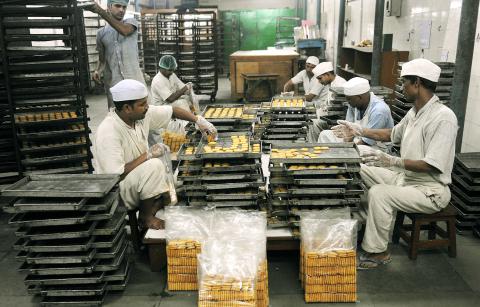Asia’s largest prison, Delhi’s Tihar Jail, has taken its first step into online retailing, offering goods over the Internet made by inmates including murderers and kidnappers.
Tihar, notorious for its overcrowding and tough criminals, is home to a bakery which produces 13 kinds of cookies and a vast paper-making unit that turns out high-end stationery under the TJ brand name. Its workshops, manned by 714 specially selected convicts, also turn out doormats, shirts, black shoes, mustard oil and polished benches that are used in Delhi government offices.
In the previous financial year, its annual revenue passed 110 million rupees (US$2.5 million), and after opening stores across the Indian capital, the prison authorities have now launched www.tihartj.nic.in.

PHOTO: AFP
“In the last year and a half, we realized that we have good production capacity, so it was time to think of the marketing,” said Rajesh Goyal, the superintendent of the factory and the brains behind the Web site.
“We hope that this Web site will increase our visibility as more and more people in Delhi are using the Internet,” he said, adding that overall output is set to increase by 60 percent this financial year.
“Initially we are aiming to deliver our products to customers in Delhi, but if international orders come, we will be happy to supply them,” he added.

PHOTO: AFP
The visually appealing Web site showcases food, furniture, paintings and clothes, all made by convicts. Computer-savvy prisoners write the html coding for the Web site, which lists each item made in the factory, along with pictures and a comprehensive price list.
Currently, items can only be ordered by phone, but authorities say that by December, customers will be able to buy and pay for products online. Pradeep Sharma, the deputy superintendent of the factory, says the TJ brand was launched 10 years ago to give inmates a sense of self worth.
“People come to jail with negative thoughts, then they are troubled by memories of home — many get depressed, show suicidal tendencies, so we want to keep them busy and give them work based on their level of skill,” he said.
All the workers get a daily wage of between 40 and 52 rupees, with additional financial incentives given to those who work past the allotted 48 hours a week. Jobs in the factory are not open to all prisoners, only those deemed “low risk” by the authorities.
“Five percent of the guys who come here are beyond repair, so we don’t let them near the factory equipment. We can’t let them handle tools like chainsaws and drills,” Sharma said.
“Sixty percent of our inmates are not criminals by profession,” he said. “They have either been involved in accidental deaths, stealing because of greed, or were in the wrong place at the wrong time. Furthermore, they are very repentant.”
To men like Mohammad Shahid, now in the 16th year of his 20-year sentence for sheltering terrorists, the factory is the only source of hope.
“I did something wrong, I didn’t know better,” the 49-year-old former shopkeeper from the northern state of Uttar Pradesh said. “I am happy working. It’s better than running a shop.”
The most senior convict at the factory, Shahid trains the other inmates and keeps records of the work done in all the units.
In the day before this reporter visited, the factory turned out 472 desks, 1,200 loaves of bread, 620 muffins, 373kg of cookies, 45m of cloth, six blankets, as well as paper, envelopes, mustard oil and 36 shirts.
One of the most high-profile convicts in recent memory, 35-year-old Siddharth Vashisht (also known as Manu Sharma) — a politician’s son convicted of killing a bartender in Delhi in 1999 — also supervises the running of the factory.
“The work is the only thing that keeps you going. Your mind stays fertile. It helps you stay in touch with reality,” he said.

Taiwan Semiconductor Manufacturing Co (TSMC, 台積電) secured a record 70.2 percent share of the global foundry business in the second quarter, up from 67.6 percent the previous quarter, and continued widening its lead over second-placed Samsung Electronics Co, TrendForce Corp (集邦科技) said on Monday. TSMC posted US$30.24 billion in sales in the April-to-June period, up 18.5 percent from the previous quarter, driven by major smartphone customers entering their ramp-up cycle and robust demand for artificial intelligence chips, laptops and PCs, which boosted wafer shipments and average selling prices, TrendForce said in a report. Samsung’s sales also grew in the second quarter, up

LIMITED IMPACT: Investor confidence was likely sustained by its relatively small exposure to the Chinese market, as only less advanced chips are made in Nanjing Taiwan Semiconductor Manufacturing Co (TSMC, 台積電) saw its stock price close steady yesterday in a sign that the loss of the validated end user (VEU) status for its Nanjing, China, fab should have a mild impact on the world’s biggest contract chipmaker financially and technologically. Media reports about the waiver loss sent TSMC down 1.29 percent during the early trading session yesterday, but the stock soon regained strength and ended at NT$1,160, unchanged from Tuesday. Investors’ confidence in TSMC was likely built on its relatively small exposure to the Chinese market, as Chinese customers contributed about 9 percent to TSMC’s revenue last

With this year’s Semicon Taiwan trade show set to kick off on Wednesday, market attention has turned to the mass production of advanced packaging technologies and capacity expansion in Taiwan and the US. With traditional scaling reaching physical limits, heterogeneous integration and packaging technologies have emerged as key solutions. Surging demand for artificial intelligence (AI), high-performance computing (HPC) and high-bandwidth memory (HBM) chips has put technologies such as chip-on-wafer-on-substrate (CoWoS), integrated fan-out (InFO), system on integrated chips (SoIC), 3D IC and fan-out panel-level packaging (FOPLP) at the center of semiconductor innovation, making them a major focus at this year’s trade show, according

DEBUT: The trade show is to feature 17 national pavilions, a new high for the event, including from Canada, Costa Rica, Lithuania, Sweden and Vietnam for the first time The Semicon Taiwan trade show, which opens on Wednesday, is expected to see a new high in the number of exhibitors and visitors from around the world, said its organizer, SEMI, which has described the annual event as the “Olympics of the semiconductor industry.” SEMI, which represents companies in the electronics manufacturing and design supply chain, and touts the annual exhibition as the most influential semiconductor trade show in the world, said more than 1,200 enterprises from 56 countries are to showcase their innovations across more than 4,100 booths, and that the event could attract 100,000 visitors. This year’s event features 17